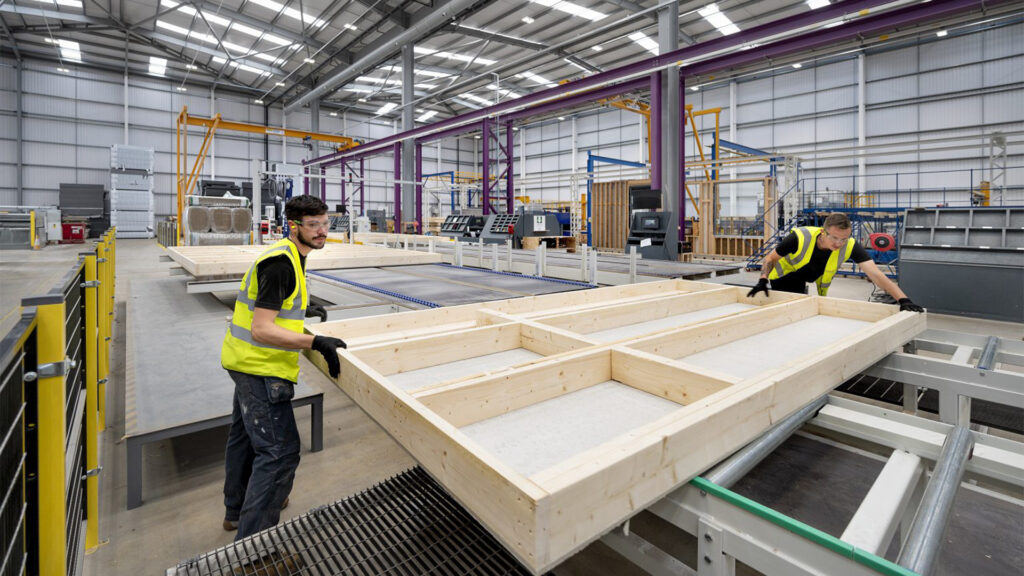The UK construction industry has found itself in somewhat of a mess since the completion of the last-minute Brexit deal last year.
Many of you will remember the stories of shipping issues that were faced prior to Christmas, with ports clogged up and stock sat in the back of transit vans and warehouses for weeks on end. That has led to businesses and suppliers being short on products and supplies and, ultimately, bearing a great deal of consumer frustration.
January felt like a perfect storm, a combination of sky-high demand in an industry that was unable to prepare properly due to a lack of clear guidance. Both of which resulted in logistical chaos.
This is just the start for the construction sector and while there’s no doubt this situation will straighten itself out, the next step is how businesses can get ahead of the game in the meantime?
To answer this and outline all of the issues the industry is facing in this logistical issues, we will need two voices – that of Tony Lambert, Senior Buyer at Protrade, the East Midlands’ number one supplier of trade tools and construction consumables, whose voice takes over this content, and a consumer, James Lescott, the founder of JL Interior Fits, who gives his opinion further down the article.
‘Intensive’ and confusing paperwork is having a huge impact on the wider supply chain
Let’s start by painting a clear picture of what is happening across the sector right now.
It’s December. A business or supplier operating within the construction sector is getting its house in order in time for Christmas and ensuring it has got enough stock in place to comfortably see it into the New Year and beyond.
It reaches out to a European supplier and places an order for a particular product. The transaction gets completed, that’s that. Done. Nothing to worry about. Except there is.
From leaving the European supplier, the product heads to the port. It’s turned away and goes back to the supplier. It returns to the port again and remains sat there until further paperwork is completed.
That’s become the norm over the last three months.
Since Brexit, no-one has been entirely sure of what paperwork is required and needs to be completed. Even products and stock which has been arriving in the UK have been left sitting in warehouses awaiting customs clearance and this has had a huge impact on the wider chain.
Likewise, UK-to-UK logistics has become an issue as one supplier, or another, faces the same product shortages. That intensive paperwork, though, is creating an entirely different issue altogether.
Suppliers are refusing to ship to the UK
Filling out that necessary paperwork has become a job in itself and has led to some European suppliers taking the view that it is actually no longer worth the hassle, nor the cost, to ship its products over to the UK.
It’s just as complicated with freight and carriage transport.
For context, prior to Brexit, the supplier took care of all those costs and that has now flipped on its head and businesses are being required to pay the charge and claim a percentage of it back from the government.
And when you combine the above with the intense amount of paperwork that is required to be completed, it leaves a huge log-jam at the ports and lengthy hold-ups.
Like a ripple effect, that is raising a fresh problem over here in the UK.
There is a heightened demand and prices are starting to creep up
While businesses and suppliers are suffering logistically, we’re also starting to see that consumers are starting to be penalised by this.
Last year, as holidays and vacations were cancelled, people across the UK, instead, turned their attention to home DIY and renovation projects. The demand went through the roof – excuse the pun – and that boom has followed us into 2021.
Without naming businesses, one UK supplier had six months’ worth of stock at the end of October in anticipation of the Brexit decision and ensuring they were covered no matter the outcome.
By the end of January, that supplier had no stock left. Like that business, no-one has been able to get ahead of the game.
As quickly as it is coming in, it is gone again. Businesses can’t get products through the door quickly enough to satisfy the demand. And if you are one of those fortunate businesses that have got the stock that others can’t get their hands on, it is the customer that is potentially paying more due to supply shortages.
Just as with Europe, prices for products and supply are creeping up in the Far East.
The view from a customer: job delays and a need for long-term investing
James Lescott is a joiner and his business, JL Interior Fits, is a specialist in high-end bathroom and kitchen installations based in Shropshire. He set up his business just a couple of years ago and has been heavily impacted not only by COVID-19, but Brexit. This is what he had to say about the current logistic issues…
“It’s very frustrating. As a customer, it has meant that jobs have had to be delayed. I try and get my stock in up to eight weeks in advance of starting a job, but due to the issues that have been faced so far this year, that stock isn’t arriving on time.
“That’s slowed work right down since Christmas. However, what that has allowed me to do is plan for the future and I have invested approximately £70,000 in machinery over the last five months that will allow me to get back on track.
“I’ve completely transformed the way I work, otherwise I don’t think I would have survived. The only way businesses, like mine, can really get through this period is by adapting.
“I think a lot of that is happening across the industry and more businesses are investing in the manufacturing process which will allow them to avoid situations like this in the future and stay ahead of the game.
“As strange as it is to say, what is happening with the supplying and shipping issues right now could prove to be a silver lining for the future of the industry.”
How can construction get ahead of the game?
As obvious as it sounds, the only thing businesses can do right now is to get ahead of the game and continue trying to get stock through the door, and on the shelves.
With that, businesses will need to be considerate about storage space. I’m sure there are many companies out there, like Protrade, that at the end of January were in a position where that backlog of stock has finally started to arrive.
We had 38 pallets from one supplier and another 28 later in the week. No business, in this industry, has infinite space, and, eventually, we could well see that businesses face a logistical problem because the arrival of stock has been impossible to calculate.
Ordinarily, we would hold six weeks’ worth, but due to the issues, many organisations will be carrying anything between eight and 12 weeks’ worth of stock to try and get over this supply issue.
Every business is in the same boat and it feels, very much, that it is the one that shouts the loudest is getting the stock.
All businesses can really do right now is try and increase their stock holdings until this situation finds a new equilibrium.




























